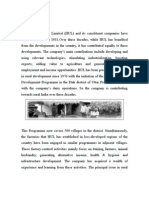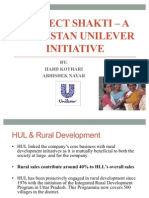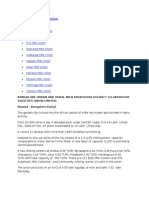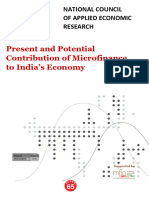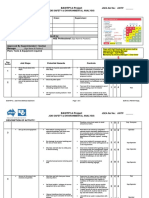Hindustan Unilever Case Study - Pdf.downloadasset
Hindustan Unilever Case Study - Pdf.downloadasset
Uploaded by
Kushagri MangalCopyright:
Available Formats
Hindustan Unilever Case Study - Pdf.downloadasset
Hindustan Unilever Case Study - Pdf.downloadasset
Uploaded by
Kushagri MangalOriginal Description:
Original Title
Copyright
Available Formats
Share this document
Did you find this document useful?
Is this content inappropriate?
Copyright:
Available Formats
Hindustan Unilever Case Study - Pdf.downloadasset
Hindustan Unilever Case Study - Pdf.downloadasset
Uploaded by
Kushagri MangalCopyright:
Available Formats
In partnership with
Hindustan Unilever: Developing a rural
sales network that enhances livelihoods
Highly Commended: Innovative project award
What Hindustan Unilever (HUL) is one of the largest companies in India. Its “Project Shakti” aims to
provide a livelihood enhancing opportunity to women micro-entrepreneurs in rural India. In an
attempt to provide regular income, these women entrepreneurs (called Shakti Ammas, ‘Shakti’
means ‘power’ and ‘Amma’ means ‘mother’), are trained on basic principles of distribution
management and familiarisation with the company’s products. Shakti Ammas receive training
and support to become micro-entrepreneurs, selling Unilever products in low-income rural
communities. The programme has three goals for Shakti Ammas: economic empowerment;
improved social standing within the family; and improved social standing within the village.
The finance team has been critical to the success of this programme. They have demonstrated
the programme’s commercial viability; applied financial analysis to identify cost savings and
efficiencies; and built robust reporting frameworks.
‘You need to believe by doing the right things and by doing
good you will grow business. And I think that’s when finance
really needs to think about different models.’
Mr Srinivas Phatak,
CFO, Hindustan Unilever
FINANCE FOR THE FUTURE www.financeforthefuture.org
Why HUL’s sustainable living plan is based on three pillars: improving health and well-being, reducing
environmental impact and enhancing livelihoods. Project Shakti is aligned with the sustainable
living plan. It aims to boost financial independence for women and, in doing so, contribute
to the economic well-being of her household and community. By engaging Shakti Ammas to
distribute Unilever products in their villages, it provides access to quality products.
‘The Shakti programme is an impressive initiative that, to date,
has financially empowered more than 1,20,000 women in rural
India. By teaching them various aspects of how to run a retail
business, from inventory to distribution management, it has
increased the average income of a Shakti household and enhanced
the lives and status of the women within their communities.’
Finance for the Future Awards judges
FINANCE FOR THE FUTURE www.financeforthefuture.org
How The company started the programme in 2001 and has been refining the model since then:
> The programme started as a controlled pilot, focused on getting the mechanics right. After
the pilot, HUL scaled up in round one. It has then incrementally introduced new elements to
the programme to scale up and expand its reach.
> Project Shakti now operates with three models: door-to-door selling within the Shakti Amma’s
village, assisted model for distribution in same and nearby villages; and operating from a small
retail outlet.
> Team of Rural Sales Promoters (RSPs) coach these women Shakti entrepreneurs by familiarising
them with HUL products in order to manage their businesses better. This includes basic
accounting and sales and troubleshooting, as well as enhancing their soft skills of negotiation
and communication. Rural sales promoters in the field provide regular guidance. They meet
monthly with each Shakti Amma and provide remote support on a weekly basis.
> Shakti Ammas earn a regular income basis their monthly sales value. Such indirect
compensation from HUL supplements their income thereby boosting their motivation
to continue the business.
> The programme’s success has led to the model being adapted and evolving in other countries.
The role of finance
The finance team has been engaged with Project Shakti from the beginning and continues to champion the
programme and support its success. Finance has brought their expertise in financial modelling, cost management
and control, payment mechanisms and reporting into the cross-functional programme team.
Financial modelling, cost management and controls
The finance team has been instrumental in cost modelling and ensuring that the cost of this sales channel is
in line with other channels, despite the challenges involved in distributing to rural areas with poor infrastructure.
They benchmarked costs for rural sales promoters and introduced efficiency improvements. These savings
enabled the programme to expand into new villages over time. Multiple governance checks were put in place
by the finance team to ensure smooth data flow and identification of any outliers periodically. Timely action on
the outliers has made this unique channel robust and scalable.
Payment mechanisms
Following the recent changes in Indian banking system, the finance team envisioned an opportunity of
introducing direct bank transfer (DBT) payments to Shakti Ammas. Finance staff played a pivotal role in
negotiating with the banks, setting up the end to end infrastructure and enabling DBT payment to be made
to offer convenience and transparency at a massive scale. This change eliminated the reliance on intermediaries
for making payments and helped plug the leakages. This enabled timely confirmation of receipt of payments
directly into the bank accounts of Shakti Ammas.
Reporting
HUL reports externally on its sustainable living plan, including individual programmes such as Project Shakti.
Finance has built robustness and scrutiny to the reporting process.
FINANCE FOR THE FUTURE www.financeforthefuture.org
The impact of the programme
HUL has capitalised government’s vision of financial households can afford better education for their
inclusion to bring transparency into its operations. children, improved access to sanitation products
Over 95% of the Shakti Ammas receive their and more household goods.
monthly earnings in their bank account and every
new Shakti is onboarded into HUL’s ecosystem only The latest third-party research from Kantar Public showed
after confirmation of her bank account details. The a 24% increase in household income, with 89% of Shakti
once financial excluded Shakti Amma has now been Ammas feeling that they had more respect within the
integrated into the formal banking framework in India. family and 83% of Shakti Ammas feeling that they had
Shakti Ammas’ earnings bring some extra income into more respect within the community.
the household which makes a significant difference
to their quality of life. HUL found that Project Shakti www.hul.co.in
DISCL AIMER
This case study presents Hindustan Unilever entry for the Finance for the Future Awards 2019. The case study
only includes information that was part of the organisation’s 2019 entry. Some of this information may now
be out of date. For a current view of the organisation’s work, please visit their website at the link given above.
The Finance for the Future Awards recognise the
role of finance in driving sustainable economies.
Click here to see more inspiring case studies or go to www.financeforthefuture.org/previous-winners
To register interest for the next awards go to www.financeforthefuture.org/entering
FINANCE FOR THE FUTURE www.financeforthefuture.org
You might also like
- Innovative and Strategic Thinking - D081 1854129Document8 pagesInnovative and Strategic Thinking - D081 1854129Ravi KumawatNo ratings yet
- Project Shakti Bottom Line Calculaiton With Other AnswersDocument6 pagesProject Shakti Bottom Line Calculaiton With Other AnswersRickMartinNo ratings yet
- Case Analysis HUL Project ShaktiDocument9 pagesCase Analysis HUL Project Shaktinishant_88No ratings yet
- Unilever in India: Hindustan Lever S Project Shakti - Marketing FMCG To The Ruralconsumer Case AnalysisDocument5 pagesUnilever in India: Hindustan Lever S Project Shakti - Marketing FMCG To The Ruralconsumer Case Analysismahtaabk100% (4)
- Rural Marketing - Project ShaktiDocument12 pagesRural Marketing - Project ShaktiMonisha HenryNo ratings yet
- Rural Marketing InitiativesDocument23 pagesRural Marketing InitiativesSaurabh GNo ratings yet
- HUL - Project ShaktiDocument3 pagesHUL - Project Shaktimjhitesh872000No ratings yet
- Project Shakti by Group3Document12 pagesProject Shakti by Group3Pavitra AgrawalNo ratings yet
- HUL Shakti FinalDocument31 pagesHUL Shakti FinalAshish Arya0% (1)
- Success Factors of Micro-Franchise Businesses in Malaysia: KeywordsDocument17 pagesSuccess Factors of Micro-Franchise Businesses in Malaysia: Keywordsngcheeguan020729No ratings yet
- Final Eco ProjectDocument14 pagesFinal Eco ProjectsachniksaquaniksNo ratings yet
- DocumentDocument9 pagesDocumentAnvesh Pulishetty -BNo ratings yet
- Hindustan Unilever Ltd's Project ShaktiDocument23 pagesHindustan Unilever Ltd's Project Shaktisiddhesh.dalviNo ratings yet
- Project Report: HUL Shakti Amma: Sustainable Livelihood SolutionsDocument6 pagesProject Report: HUL Shakti Amma: Sustainable Livelihood Solutionsvatan jugnakeNo ratings yet
- A Case Study On "Unilever in India: Hindustan Lever's ProjectDocument10 pagesA Case Study On "Unilever in India: Hindustan Lever's ProjectPongu RaohNo ratings yet
- Group WorkDocument5 pagesGroup WorkJack MainaNo ratings yet
- Heart Run, The KCB Lion's Den, Blaze by Safaricom and Equity's Wings To Fly Are But A Few Initiatives by Entrepreneurs That Are Contributing TowardsDocument1 pageHeart Run, The KCB Lion's Den, Blaze by Safaricom and Equity's Wings To Fly Are But A Few Initiatives by Entrepreneurs That Are Contributing TowardsJusteen BalcortaNo ratings yet
- Share Microfin LimitedDocument2 pagesShare Microfin Limiteddasarup24123No ratings yet
- Topic:-Opportunities and Challenges For Entrepreneurship Development in IndiaDocument16 pagesTopic:-Opportunities and Challenges For Entrepreneurship Development in Indiaakshay jadhav100% (1)
- ShaktiDocument18 pagesShaktiHard KothariNo ratings yet
- Term Paper TQMDocument10 pagesTerm Paper TQMKathy SarmientoNo ratings yet
- Itc Hul IntroductionDocument6 pagesItc Hul IntroductionSurya RanaNo ratings yet
- Basix Ar 2011-12Document196 pagesBasix Ar 2011-12maahi7No ratings yet
- Can Social Entrepreneurship Change The Face of India?Document17 pagesCan Social Entrepreneurship Change The Face of India?rashtaranNo ratings yet
- Rural Marketing by FMCG SectorDocument5 pagesRural Marketing by FMCG SectorsagarsononiNo ratings yet
- Unilever Pakistan Limited Annual Report 2015 Tcm1267 479876 enDocument71 pagesUnilever Pakistan Limited Annual Report 2015 Tcm1267 479876 enHaris ButtNo ratings yet
- Astorianz Industries PVT LTD.: Schemes at Central IndiaDocument3 pagesAstorianz Industries PVT LTD.: Schemes at Central IndiavedantNo ratings yet
- UntitledDocument83 pagesUntitledSUVETHA S PSGRKCWNo ratings yet
- Reflection Paper 4 - Kunal Bindra - 1611255Document3 pagesReflection Paper 4 - Kunal Bindra - 1611255Kunal BindraNo ratings yet
- NAVYA S-A0102219128-BOP Psda 1Document4 pagesNAVYA S-A0102219128-BOP Psda 1Amartya SrivastavaNo ratings yet
- KMF Bangalore Milk UnionDocument36 pagesKMF Bangalore Milk Uniontom012No ratings yet
- Hul ShaktiDocument2 pagesHul ShaktiAditya SinghNo ratings yet
- Joywo Updated003Document28 pagesJoywo Updated003Hezekia KiruiNo ratings yet
- CV SampleDocument3 pagesCV Sampleymukhtar897No ratings yet
- Unilever in India: Hindustan Lever's Project Shakti-Marketing FMCG To The Rural ConsumerDocument15 pagesUnilever in India: Hindustan Lever's Project Shakti-Marketing FMCG To The Rural ConsumerIshtmeet SinghNo ratings yet
- Project Report Business Development Analysis": NashikDocument60 pagesProject Report Business Development Analysis": NashikHarish BhagwatNo ratings yet
- Draft Plan For MF+ Business Activity: C C C C CDocument5 pagesDraft Plan For MF+ Business Activity: C C C C CAbhishek KumarNo ratings yet
- Introduction Shakti AmmaDocument5 pagesIntroduction Shakti Ammavatan jugnakeNo ratings yet
- Step1 1Document11 pagesStep1 1vaibhav patilNo ratings yet
- EssayDocument4 pagesEssay2093 Disha ShettyNo ratings yet
- Concept Paper: Business Development & Planning DeptDocument13 pagesConcept Paper: Business Development & Planning DeptArefayne WodajoNo ratings yet
- English ProjectDocument15 pagesEnglish ProjectneetuprakashpandeyNo ratings yet
- HUL CSR PolicyDocument13 pagesHUL CSR PolicyAsta la vista100% (1)
- An Organisational Study at KMF Mother Dairy Yalahanka, BangaloreDocument79 pagesAn Organisational Study at KMF Mother Dairy Yalahanka, BangaloreShubakar ReddyNo ratings yet
- ITC Industry AnalysisDocument27 pagesITC Industry AnalysisGaurav Verma100% (1)
- Rural Marketing: Case Analysis: Unilever in India: Hindustan Lever'sDocument10 pagesRural Marketing: Case Analysis: Unilever in India: Hindustan Lever'sabhiNo ratings yet
- Developing and Launching Agri-Entrepreneurs For Doubling Farmer's ProfitDocument15 pagesDeveloping and Launching Agri-Entrepreneurs For Doubling Farmer's ProfitJyotsna MehtaNo ratings yet
- Ujjivan: Build A Better LifeDocument21 pagesUjjivan: Build A Better LifeAshish GuptaNo ratings yet
- Marketing Strategyof Hindustan Unilever Limited: 1) Hul'S Focus On New Products, Data Analytics To Boost MarginsDocument7 pagesMarketing Strategyof Hindustan Unilever Limited: 1) Hul'S Focus On New Products, Data Analytics To Boost MarginsRITIKANo ratings yet
- Effects of Inflation On Performance Microfinance InstitutionsDocument33 pagesEffects of Inflation On Performance Microfinance InstitutionsHissan Zia Khan100% (2)
- Sustinable Marketing Project: Analysis of Sustainability and CSR Report of Hindustan Unilever LimitedDocument16 pagesSustinable Marketing Project: Analysis of Sustainability and CSR Report of Hindustan Unilever LimitedPraharsh ShahNo ratings yet
- Creating Shared Value Version 1Document16 pagesCreating Shared Value Version 1Gayatri TanejaNo ratings yet
- MFIN-NCAER Report On "Present and Potential Contribution of Microfinance To India's Economy"Document78 pagesMFIN-NCAER Report On "Present and Potential Contribution of Microfinance To India's Economy"V KeshavdevNo ratings yet
- Changing Lives in Rural India Presented By: Ganga Kumar MBA Session-2018-20 Roll No-64Document10 pagesChanging Lives in Rural India Presented By: Ganga Kumar MBA Session-2018-20 Roll No-64narendraNo ratings yet
- Ankur Introduction WofDocument12 pagesAnkur Introduction WofKNo ratings yet
- Group1 SecA UnileverDocument5 pagesGroup1 SecA UnileverTanoy DharNo ratings yet
- CAFE Flyer - Good ReturnDocument2 pagesCAFE Flyer - Good ReturnAyu BulanNo ratings yet
- Amul and Its ProductsDocument6 pagesAmul and Its ProductsVrushali GhotavadekarNo ratings yet
- Enhancing Energy-Based Livelihoods for Women Micro-Entrepreneurs: India Gender Equality Results Case StudyFrom EverandEnhancing Energy-Based Livelihoods for Women Micro-Entrepreneurs: India Gender Equality Results Case StudyNo ratings yet
- Financial Ratios of BNL Stores For The Years 2018-19-20 Liquidity RatiosDocument3 pagesFinancial Ratios of BNL Stores For The Years 2018-19-20 Liquidity RatiosKushagri MangalNo ratings yet
- CFA Level I 2021 - 2022 Curriculum Changes: Subjects 2021 Reading No Reading NameDocument20 pagesCFA Level I 2021 - 2022 Curriculum Changes: Subjects 2021 Reading No Reading NameKushagri MangalNo ratings yet
- Effectuation: Elements of Entrepreneurial Expertise: January 2008Document24 pagesEffectuation: Elements of Entrepreneurial Expertise: January 2008Kushagri MangalNo ratings yet
- Starbucks Delivering Customer ServiceDocument4 pagesStarbucks Delivering Customer ServiceKushagri MangalNo ratings yet
- Journal Pre-Proofs: Computers & Industrial EngineeringDocument87 pagesJournal Pre-Proofs: Computers & Industrial EngineeringKHADIJA ABOUTAMMAMNo ratings yet
- DessertationDocument13 pagesDessertationRiya VermaNo ratings yet
- Principles of Marketing: Analyzing The Marketing EnvironmentDocument46 pagesPrinciples of Marketing: Analyzing The Marketing EnvironmentWajahat AliNo ratings yet
- ADMN4101 Week 10 F22Document24 pagesADMN4101 Week 10 F22Lingua PolyNo ratings yet
- Final Assignment MGT-304Document13 pagesFinal Assignment MGT-304Ahsan KhanNo ratings yet
- Reusable Notebooks: ProductDocument1 pageReusable Notebooks: ProductDikshaNo ratings yet
- 4: Social and Ethical Entrepreneurship: Dr. Jaap Van Baars Spring 2022Document35 pages4: Social and Ethical Entrepreneurship: Dr. Jaap Van Baars Spring 2022samNo ratings yet
- Lecture 4 - Project Management IDocument3 pagesLecture 4 - Project Management IcliffNo ratings yet
- ABB - Drives - Lifecycle PM ScheduleDocument1 pageABB - Drives - Lifecycle PM ScheduleEldar IsgenderovNo ratings yet
- IKEA SUSTAINABILITY Report FY 23 20240125 1b190c008fDocument59 pagesIKEA SUSTAINABILITY Report FY 23 20240125 1b190c008fmary_21roseNo ratings yet
- Wal-Mart Sustainability:: Is It Corporate Social Responsibility?Document33 pagesWal-Mart Sustainability:: Is It Corporate Social Responsibility?Sankalp VashishhathaNo ratings yet
- BAWTP1A Project: (Sign Name & Position (Sign Name & PositionDocument6 pagesBAWTP1A Project: (Sign Name & Position (Sign Name & PositionazerNo ratings yet
- Jawad Ahmad Ob1Document4 pagesJawad Ahmad Ob1Jawad ahmadNo ratings yet
- TM1 - Waste Management PlanDocument3 pagesTM1 - Waste Management PlanRachel GriponNo ratings yet
- Recognizing The Potential MarketDocument5 pagesRecognizing The Potential MarketRutchel100% (1)
- Project Report ON Research Methodology PGDM BATCH (2019-21) SEC - (A)Document5 pagesProject Report ON Research Methodology PGDM BATCH (2019-21) SEC - (A)amit chambhareNo ratings yet
- Total Productive Maintenance Goal TPMDocument12 pagesTotal Productive Maintenance Goal TPMMuhamad Arif Maulana MaulanaNo ratings yet
- Module 1 MGTECODocument3 pagesModule 1 MGTECOJohn DelacruzNo ratings yet
- Done By: Abdul Razzakh-025 Semester: 8 College: JNIAS-SPADocument6 pagesDone By: Abdul Razzakh-025 Semester: 8 College: JNIAS-SPArazzakhNo ratings yet
- Cause and Effect of MudaDocument3 pagesCause and Effect of Mudaabem BZNo ratings yet
- National Fenestration Rating Council Incorporated: NFRC 400-2010Document12 pagesNational Fenestration Rating Council Incorporated: NFRC 400-2010ali.makrii makriNo ratings yet
- Developing ESG - Impact To Achieve Scale - TLG-Future Africa Venture DebtDocument12 pagesDeveloping ESG - Impact To Achieve Scale - TLG-Future Africa Venture DebtAyomikun OgunkanmiNo ratings yet
- Untitled 1Document11 pagesUntitled 1Abby KakimbaNo ratings yet
- 1.HSE Plan COC Ammonia Converter 5A-105-D (Deal Ver)Document34 pages1.HSE Plan COC Ammonia Converter 5A-105-D (Deal Ver)Dony Arga WijayaNo ratings yet
- Template PPT PLN IP 2024 FinalDocument24 pagesTemplate PPT PLN IP 2024 FinalRendal Operasi & TE UPK Asam AsamNo ratings yet
- Pengaruh Sustainability Reporting Terhadap Nilai Perusahaan Dengan Leverage Sebagai Variabel ModeratingDocument3 pagesPengaruh Sustainability Reporting Terhadap Nilai Perusahaan Dengan Leverage Sebagai Variabel Moderatinganggi anythingNo ratings yet
- Corporate Social Responsibility: Vijay Kumar Sarabu Dr. Rajni SalujaDocument9 pagesCorporate Social Responsibility: Vijay Kumar Sarabu Dr. Rajni SalujafdbhdfhbNo ratings yet
- Jsa Erection Concrete Structure Cooling TowerDocument8 pagesJsa Erection Concrete Structure Cooling TowerMuhammad YusufNo ratings yet
- Zero Incident Program No.1Document17 pagesZero Incident Program No.1AWTSS SooNo ratings yet





